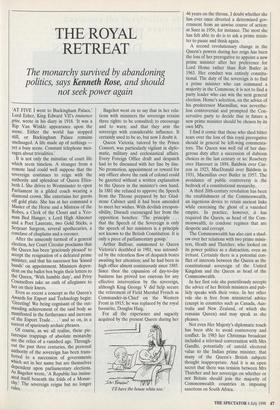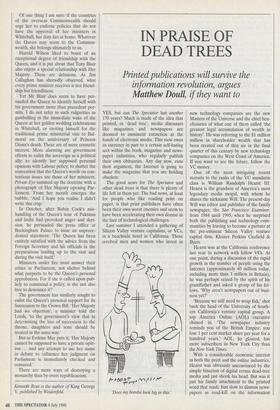THE ROYAL RETREAT
The monarchy survived by abandoning not seek power again
`AT FIVE I went to Buckingham Palace,' Lord Esher, King Edward VII's eminence grise, wrote in his diary in 1918. 'It was a Rip Van Winkle appearance. upon the scene. Either the world has stopped still, or Buckingham Palace remains unchanged. A life made up of nothings yet a busy scene. Constant telephone mes- sages about trivialities.'
It is not only the minutiae of court life which seem timeless. A stranger from a remote land could well suppose that the sovereign continues to reign with the authority and splendour of Queen Eliza- beth I. She drives to Westminster to open Parliament in a gilded coach wearing a diamond crown. She entertains her guests off gold plate. She has at her command a Master of the Horse and a Mistress of the Robes, a Clerk of the Closet and a Yeo- man Bed Hanger, a Lord High Almoner and a Poet Laureate, two Gold Sticks, a Setjeant Surgeon, several apothecaries, a conclave of chaplains and a coroner. After the unseemly turmoil of a general election, her Court Circular proclaims that the Queen has been 'graciously pleased' to accept the resignation of a defeated prime minister, and that his successor has 'kissed hands' on appointment. Ministers depen- dent on the ballot box begin their letters to the Queen, 'With humble duty', and Privy Counsellors take an oath of allegiance to her on their knees.
Even so recent a concept as the Queen's Awards for Export and Technology begin: Greeting! We being cognisant of the out- standing achievement of the said body as manifested in the furtherance and increase of the Export Trade . . . ' and so on, in a torrent of spuriously archaic phrases. Of course, as we all realise, these pic- turesque trappings of absolute monarchy are the relics of a vanished age. Through- out the past three centuries, the personal authority of the sovereign has been trans- ferred to a succession of governments which act in her name but are themselves dependent upon parliamentary elections. As Bagehot wrote, 'A Republic has insinu- ated itself beneath the folds of a Monar- chy.' The sovereign reigns but no longer Bagehot went on to say that in her rela- tions with ministers the sovereign retains three rights: to be consulted; to encourage and to warn; and that they arm the sovereign with considerable influence. It certainly used to be so, but now I doubt it.
Queen Victoria, tutored by the Prince Consort, was particularly vigilant in diplo- matic, military and ecclesiastical affairs. Every Foreign Office draft and despatch had to be discussed with her line by line. No promotion, appointment or reward for any officer above the rank of colonel could be gazetted without a written explanation to the Queen in the minister's own hand. In 1881 she refused to approve the Speech from the Throne prepared by her Glad- stone Cabinet until it had been amended to meet her wishes. With devilish irrespon- sibility, Disraeli encouraged her from the opposition benches: 'The principle . . that the Speech of the Sovereign is only the speech of her ministers is a principle not known to the British Constitution. It is only a piece of parliamentary gossip.'
Arthur Balfour, summoned to Queen Victoria's deathbed in 1901, was astound- ed by the relentless flow of despatch boxes awaiting her attention; and he had been in high office almost continuously since 1885. Since then the expansion of day-to-day business has proved too onerous for any effective intervention by the sovereign, although King George V did help secure the retirement of Field Marshal French as Commander-in-Chief on the Western Front in 1915; he was replaced by the royal favourite, Douglas Haig.
For all the experience and sagacity acquired by the present Queen during her `1W have the house white too.' 46 years on the throne, I doubt whether she has ever once diverted a determined gov- ernment from an unwise course of action: at Suez in 1956, for instance. The most she has felt able to do is to ask a prime minis- ter to pause and think again.
A second revolutionary change in the Queen's powers during her reign has been the loss of her prerogative to appoint a new prime minister after her preference for Lord Home rather than Rab Butler in 1963. Her conduct was entirely constitu- tional. The duty of the sovereign is to find a prime minister who can command a majority in the Commons; it is not to find a party leader who can win the next general election. Home's selection, on the advice of his predecessor Macmillan, was neverthe- less controversial and prompted the Con- servative party to decide that in future a new prime minister should be chosen by its own MPs.
I find it comic that those who shed bitter tears over the loss of this royal prerogative should in general be left-wing commenta- tors. The Queen was well rid of her dan- gerous duty after a succession of dubious choices in the last century or so: Rosebery over Harcourt in 1894, Baldwin over Cur- zon in 1923, MacDonald over Baldwin in 1931, Macmillan over Butler in 1957. The avoidance of public controversy is the bedrock of a constitutional monarchy.
A third 20th-century revolution has been the establishment of the Commonwealth, an ingenious device to retain ancient links while exorcising the ghost of a vanished empire. In practice, however, it has required the Queen, as head of the Com- monwealth, to condone regimes that are despotic and corrupt.
The Commonwealth has also cast a shad- ow over her relations with two prime minis- ters, Heath and Thatcher, who looked on its power politics as a distraction, even an irritant. Certainly there is a potential con- flict of interests between the Queen as the constitutional sovereign of the United Kingdom and the Queen as head of the Commonwealth.
In her first role she punctiliously accepts the advice of her British ministers and pub- licly speaks with their voice. In her other role she is free from ministerial advice (except in countries such as Canada, Aus- tralia and New Zealand, of which she remains Queen) and may speak as she pleases.
Not even Her Majesty's diplomatic touch has been able to avoid controversy and conflict. In 1983 her Christmas broadcast included a televised conversation with Mrs Gandhi, potentially of untold electoral value to the Indian prime minister, that many of the Queen's British subjects thought inappropriate. And it is an open secret that there was tension between Mrs Thatcher and her sovereign on whether or not Britain should join the majority of Commonwealth countries in imposing sanctions on South Africa. Of one thing I am sure: if the countries of the overseas Commonwealth should urge her to endorse policies that do not have the approval of her ministers in Whitehall, her duty lies at home. Whatever the Queen may seem to the Common- wealth, she belongs ultimately to us.
Harold Wilson liked to boast of an exceptional degree of friendship with the Queen, and it is put about that Tony Blair also enjoys a special relationship with Her Majesty. These are delusions. As Jim Callaghan has shrewdly observed, what every prime minister receives is not friend- ship but friendliness.
Yet Mr Blair does seem to have per- suaded the Queen to identify herself with his government more than precedent per- mits. I do not refer to such vulgarities as gambolling in the immediate wake of the Queen at her golden wedding celebrations in Whitehall, or inviting himself for the traditional prime ministerial visit to Bal- moral on the anniversary of Princess Diana's death. These are of mere cosmetic interest. More alarming are government efforts to enlist the sovereign as a political ally; to identify her supposed personal opinions with Labour policy; to shatter the convention that the Queen's words on con- tentious issues are those of her ministers. Private Eye summed up the doctrine with a photograph of Her Majesty opening Par- liament. From her mouth emerges the bubble, 'And I hope you realise I didn't write this crap.'
In October, after Robin Cook's mis- handling of the Queen's tour of Pakistan and India had provoked anger and deri- sion, he persuaded the press office at Buckingham Palace to issue an unprece- dented statement: The Queen has been entirely satisfied with the advice from the Foreign Secretary and his officials in the preparations leading up to the visit and during the visit itself.'
Ministers under fire must answer their critics in Parliament, not shelter behind what purports to be the Queen's personal approbation. For if she is called upon pub- licly to commend a policy, is she not also free to denounce it?
The government has similarly sought to enlist the Queen's personal support for its Succession to the Crown Bill. 'Her Majesty had no objection', a minister told the Lords, 'to the government's view that in determining the line of succession to the throne, daughters and sons should be treated in the same way.'
But as Erskine May puts it, 'Her Majesty cannot be supposed to have a private opin- ion . . . and any attempt to use her name in debate to influence her judgment on Parliament is immediately checked and censured.'
There are more ways of destroying a monarchy than by overt republicanism.
Kenneth Rose is the author of King George V, published by Weidenfeld.















































































































 Previous page
Previous page